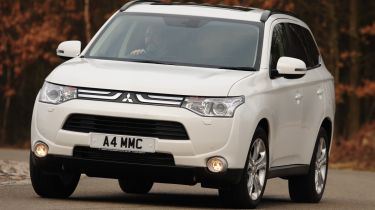Mitsubishi Outlander 2.2 DI-D GX4
The new Outlander aims to build on the previous car’s off-road talents with upmarket feel and better drive on road
You get lots of kit for your money, and the Outlander is the best car here for off-road use. But the cheap-feeling plastics, tinny build quality and complicated seat-folding mechanisms mean it brings up the rear in this test.
Mitsubishi has a strong reputation for building capable 4x4s of assorted shapes and sizes. From the illustrious line of rally bred Evo saloons all the way to the L200 pick-up, it knows a thing or two about producing cars for the rough stuff. And the new Outlander is no exception to this rule.
However, the car has a softer look than the model it replaces. Gone is the vast, Evo X-style gaping grille, in favour of slender lights and a stylised nose over a large front bumper.
The front is a little reminiscent of the Citroen C-Crosser – a car that shared much with the previous Outlander. But the slab sides, tall ride height, low roofline and narrow rear end give the Mitsubishi an awkward look compared with its chunky rivals here.
Climb inside and, while the interior has taken a step forward over the old car, the large expanse of black dash plastic looks dated compared with the Hyundai’s grey and silver centre console.
Used - available now

2021 BMW
M240i
44,121 milesAutomaticPetrol3.0L
Cash £18,587
2019 Ford
Kuga
50,005 milesAutomaticDiesel2.0L
Cash £14,000
2018 Audi
A3 Saloon
53,645 milesAutomaticPetrol1.5L
Cash £14,487
2020 Volkswagen
Golf GTI
45,405 milesAutomaticPetrol2.0L
Cash £19,787Piano black trim is meant to add a touch of class, but this is spoiled by its orange peel finish, while hard plastics are used throughout. The colour display between the dials looks modern and is easy to read, but the interior doesn’t quite have the quality feel of either the Hyundai or Kia. Another annoyance are the multiple warning beeps that chime every time you turn the ignition.
At least there’s plenty of space for driver and passengers, while the middle row of seats slides back and forth, and both back rows fold flat. But while its rivals feature a single pull cord to operate each of the rearmost seats, the Outlander has two – one to unfold, the other to collapse. It’s fiddly, while space is limited.
Headroom is also compromised in the left-hand seat by a roof blister that houses the seatbelt for the middle seat of the second row. Plus, you have to flick a lever next to the middle row to switch between folding the seat flat and moving it to access the back row.
On the road, the Outlander matches its rivals for performance, although the 2.2-litre diesel is clattery at low speeds and gruff when accelerating. The car trails the other models in this test for towing capacity, too.
The top-spec GX5 in our pictures (we tested the lesser GX4) has an SST twin-clutch auto, and its seamless changes meant the car was as fast as the manual Kia and Hyundai at the track. Unfortunately, the Mitsubishi is uninspiring in corners, despite claims that it shares its DNA with the Evo X. It suffers from more body roll than its rivals and has less grip, while mid-corner bumps unsettle the suspension easily.
Where the Outlander excels is off road. The short front and rear overhangs, greater ground clearance and lockable four-wheel drive mean it showed a clean pair of heels to its rivals here, despite having relatively wide tyres on 18-inch wheels.
The Outlander has plenty of standard kit, too. Dual-zone climate control, sat-nav (albeit an aftermarket system), heated leather seats, a reversing camera and auto lights and wipers are all included on the GX4 model we tested.
While the Kia and Hyundai can match this, the Mitsubishi also adds standard xenon lights and keyless starting. However, if you want luxuries such as a DAB radio and electric tailgate, or safety kit such as lane departure warning, adaptive cruise control and forward collision detection, you’ll have to upgrade to the GX5 model, which costs £4,000 extra.
In terms of other costs, the Outlander sits two road tax bands below its rivals, as it’s the cleanest car here, with emissions of 140g/km. It used the least fuel, returning 32.4mpg on test, and is also the cheapest company car choice.
Poorer residual values and a more expensive fixed-price servicing deal blot the financial copy book, however. The question is whether the Outlander’s off-road and financial talents can make up for its deficiencies elsewhere.







